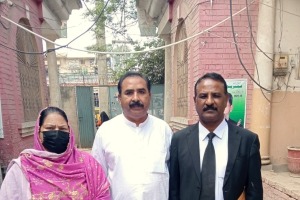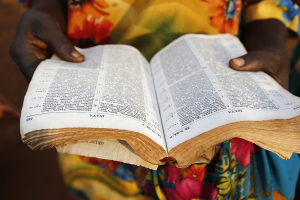Christian woman abducted, killed for refusing to convert to Islam in Pakistan

LAHORE, Pakistan — A Christian family in Lahore, Pakistan is seeking justice and protection after four Muslims abducted, gang-raped and killed a widow for refusing to convert to Islam and marry the primary suspect, sources said.
In the killing of 40-year-old Shazia Imran last month, the assailants slashed her neck and doused her with acid, her brother said, though it was not known if the acid burns came before or after her death. The primary suspect has confessed to the killing, according to police.
Shazia Imran’s husband also was killed a year and a half ago, and the family has seen no justice in that case either as police cast it as an accident, said her brother, Zafar Masih.
Shazia Masih, who began working as a nanny at a daycare center at the Lahore University of Management Sciences after her husband’s death, left her rented home in Lahore’s Mehar Town for work on June 6 but did not return, Zafar Masih said. He said that the primary suspect, Noman (known as Mani) Gujjar, was a notorious area criminal and had been pressuring her to convert to Islam along with her children and marry him.
“Shazia did not share this with us due to fears for our security, but three days before her abduction, she told [another relative] that Gujjar had threatened to kill her if she did not surrender to his demand,” Zafar Masih told Morning Star News.
After Shazia Masih’s oldest son, 16, informed Zafar Masih that she had not returned home, he and other relatives began searching for her. Unable to find her, they informed police of her disappearance on June 7.
“Later in the day we received a call from the Hyer police station that they had found a body from a plot that matched Shazia’s description,” Zafar Masih said. “We immediately went to the police station, but when we saw the body, we could not believe our eyes. Shazia’s jugular vein had been slit with a sharp object, and her body had been badly burnt by acid.”
A forensic examination revealed that she had been gang-raped before being killed, said Zafar Masih, a member of a local Evangelical church.
Police arrested Gujjar, and though he confessed to the murder, officers seemed uninterested in arresting three suspected accomplices, Gujjar’s brother and two cousins, Zafar Masih said.
“The accused are very influential, and they have been persistently threatening us to reconcile and withdraw the case,” he said. “Due to these threats, we have been forced to go into hiding and are not even free to pursue the case. Gujjar is still in police custody, but we doubt that we’ll get justice for our sister, as the police’s bias is evident by its inaction against the remaining accused.”
Zafar Masih said the incident had traumatized Shazia’s children, the oldest as well as a 7-year-old and a 6-year-old. His elderly mother is taking care of them.
“We have lost all hope for justice and appeal to our church leaders and government officials to provide justice and security to us,” he said.
Soon after a video appeal of the family began circulating on social media, Punjab police released a tweet from its official handle stating that they regretted the murder taking on a “religious color.”
“The main accused in his confessional statement has said that the woman had developed relations with him after her husband’s death and had now started blackmailing him, prompting him to murder her,” the tweet in Urdu stated.
Police were conspicuously silent, however, on any evidence of blackmail and how or why it would have been attempted, nor on why the remaining three suspects have not been arrested. Morning Star News made repeated attempts to question the superintendent of police and the investigating officer, but their phones remained inaccessible.
Vulnerability of minority women
Pakistan is facing global censure for its shaky commitments to safeguarding religious minorities and the unwillingness of the Pakistani government to denounce extremism without equivocation.
While Pakistan’s draconian blasphemy laws have been widely condemned by the international community, forced conversions are now the primary means of wiping out Christian communities in Pakistan, church leaders and rights activists say.
Despite attempts to pass legislation against forced conversions, especially in provincial assemblies, liberal Pakistani legislators have been unable to do so, nor amend Pakistan’s child marriage laws. Samson Salamat, chairman of socio-political movement Rawadari Tehreek, said the murder of Shazia Imran was further evidence of the vulnerability faced by Pakistani women in general and minority women in particular.
“This gory incident is also an example that with forced marriage, minority women have to go through the trauma of changing their faith and in case of refusal, the result is even worse,” Salamat told Morning Star News. “Shazia’s case is crystal clear, but the circumstances show that the police are siding with the influential perpetrators instead of administering justice to the victim’s family. The situation is critical, as the family is fearful of even pursuing the case due to constant threat to their lives.”
Bishop Azad Marshall, president of the Church of Pakistan, condemned the killing and police inaction against the perpetrators.
“Our hearts go out to the children and other family members of our deceased sister,” Marshall told Morning Star News. “The manner in which the poor woman was raped and murdered and her body mutilated by acid has shocked the entire Christian community. We are now hearing such cases of aggression and brutality against Christian women almost on a daily basis, and we demand the government to take cognizance of such crimes and make examples of the perpetrators.”
The senior church leader said they had taken notice of the family’s appeal for help and vowed to stand with them in their pursuit for justice.
“We are already fighting to save our young girls from the scourge of forced faith conversions, but our married women are also increasingly being targeted to convert and marry Muslims,” he said. “This is unacceptable.”
Each year dozens of girls, mostly teenagers from the Hindu community in the southern province of Sindh, along with minority Christians in Punjab Province, fall victim to forced conversions facilitated by Muslim leaders and groups, according to rights activists.
At least 124 cases of forced faith conversions were reported in 2022, according to the Lahore-based Center for Social Justice; 81 Hindus, 42 Christians and one Sikh. Shockingly, 23% of the girls were below 14 years old, and 36% were between the age of 14 and 18 years. Only 12% of the victims were adults, while the age of 28 percent of the victims was not reported.
The center stated that 65% of the cases were reported in Sindh Province, followed by 33% in Punjab Province and 0.8% each in Khyber Pakhtunkhwa and Balochistan provinces.
The United States last year placed Pakistan on its list of “Countries of Particular Concern” for religious freedom violations. Pakistan ranked seventh on Open Doors’ 2023 World Watch List of the most difficult places to be a Christian, up from eighth the previous year.
Morning Star News is the only independent news service focusing exclusively on the persecution of Christians. The nonprofit's mission is to provide complete, reliable, even-handed news in order to empower those in the free world to help persecuted Christians, and to encourage persecuted Christians by informing them that they are not alone in their suffering.





























